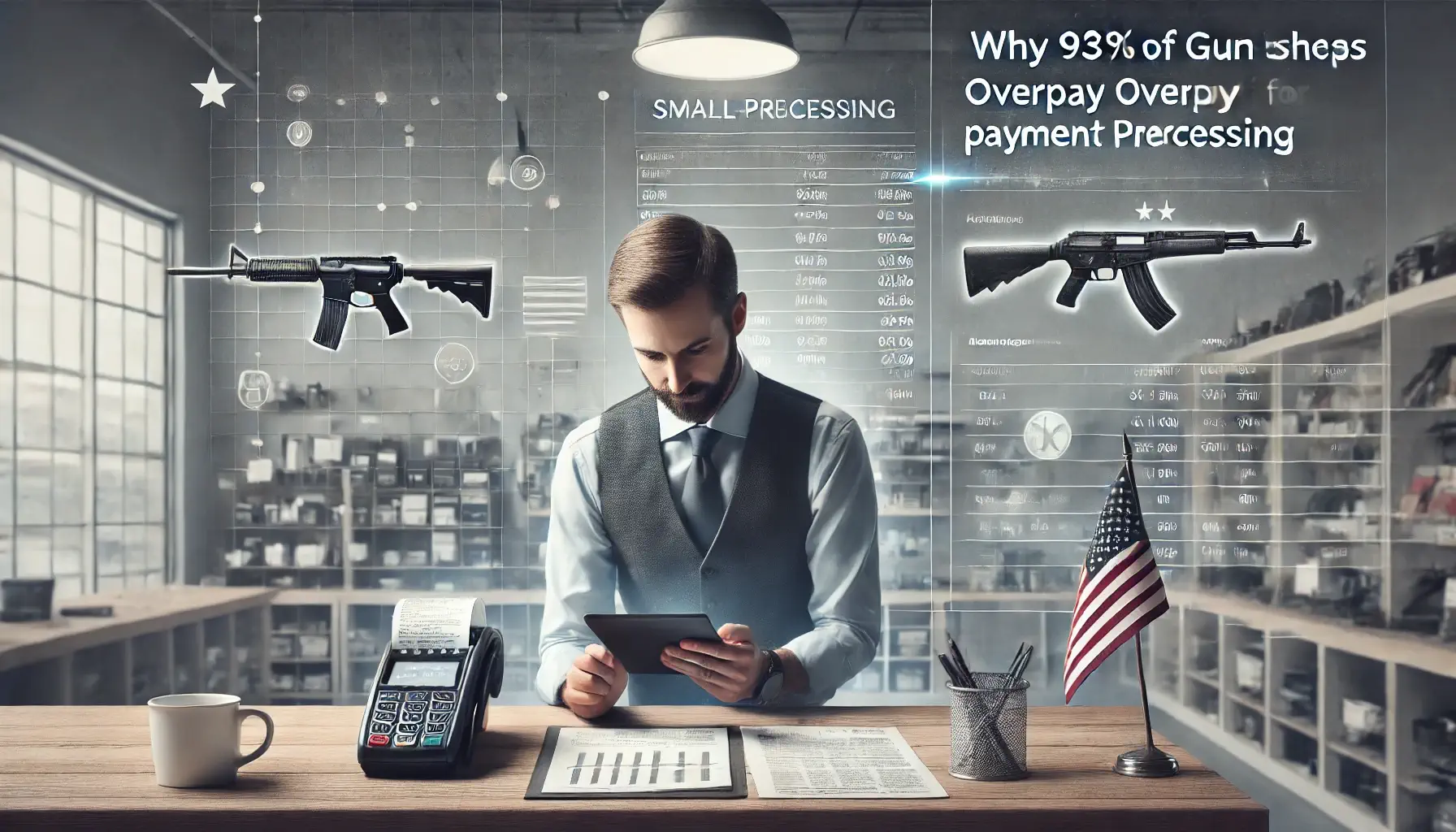Welcome to BKW Servicing
Welcome to BKW Servicing

No gun shop owner likes to see the payment processing fee when they make a sale, but most see it as a necessary evil. Everyone has payment processing fees these days, and it’s only a small percentage, after all. But those small percentages can add up over the course of a day, a week, or a sales quarter. This is especially true when you consider that most gun shops are actually overpaying for payment processing.
How does that happen? And what can you do to keep from haemorrhaging money to processing overcharges? Let’s break it all down in today’s blog.
Gun shops tend to face higher payment processing fees on the whole compared to other businesses. This is because gun shops are considered “high-risk” businesses. Whether that’s just a stereotype or an actual concern, it does mean that payment vendors often take caution when working with gun shops: asking for additional forms of verification or, as we often see, charging higher processing fees.
The current disputes of public opinion when it comes to guns can also impact the processing charges. As more of the public calls for tighter gun control, failure to comply with frequently changing regulations can lead to penalty charges or even banned accounts from some processors. For gun shops in California, major cards such as American Express, Mastercard, and Visa have begun to require a standalone code from merchants that would track gun purchases.
While processing fees may be easy to overlook in many cases, the impact can be harsh on your business. The higher your processing fees, the more guns you have to sell in order to make a profit. Which may mean having to pour more money into marketing and sales to bring in more customers, and soon you can find yourself paying more just in hopes of making a profit. When you sell online, purchase disputes or stolen IDs and fraud can also heighten processing fees and frustrating account holds, making it difficult to sell in the first place.
And overcharging also happens often without shop owners noticing. It’s important to keep an eye out for certain red flags that warn you might be overcharged:
Ultimately, you should also trust your instincts. If it feels like you’re overpaying for payment processing, investigate that feeling. There’s a good chance that you’re right.
It’s critical to find a merchant service provider who understands the specific needs and regulations gun shop owners are facing. Payment processors that are more supportive of gun shops may offer lower payment processing fees than their competition, saving you money so that you can maximize the profits from your sales.
So what should you look for in a gun shop merchant account provider?
Some merchant service providers may compare their rates to their competition on their website. While this sort of transparency is a relief, you should also make sure that this information is accurate by checking secondary sources. Read all of the fine print on any documentation they offer, and investigate any terms you don’t know. And once you begin to work with a payment processor, make sure that you investigate any hidden fees. If you don’t, you may continue to be overcharged due to a clerical error.
Once you’re aware that you are overpaying for payment processing, the next question is whether to transition to another payment processor altogether. If you find that the overcharging issue is having a significant impact on your profit, changing payment processors is probably the best plan. If it is an insignificant amount, the transition may be more of a headache or hassle than you need.
Consult with the merchant services provider you’re interested in switching to about the process of working with them. Research them thoroughly and ask about any tools or services they might offer that would make the transition easier. Speak to whoever takes care of your billing about the change so that they can prepare for the transition, as well. If you take care of your own billing, you already have this covered.
Once you’ve settled on that provider, terminate services with your current provider and begin services with the new provider. You may also choose to work with multiple merchant account providers if needed, though often this works best if there’s some delineation. For instance, it might be that one provider is more effective for one card and the other provider covers all of your other transactions more effectively. But it’s always better to simplify. If you can find one merchant services provider that handles all of your payment processing needs, this is the best option.
Finally, make sure to monitor the impact of this change on your business. After the first quarter, assess: are things improving? Are you noticing fewer hidden charges or instances of overcharging? Is payment processing running smoother? If not, you may need to search for a different solution. Monitoring the impact may help you to avoid overpaying in the future.
Compliance is key when it comes to online transactions for gun shops, especially in this politically fraught climate. The best benchmark is the Payment Card Industry Data Security Standard (PCI DSS), which enacts security controls such as encrypting sensitive data, secure protocols for data transmission, and regular updating and patching of systems to protect against cyber hacking. Secure Sockets Layer (SSL) certificates also work by encrypting data between the user’s browser and the server, thus preventing unauthorized access.
BKW Servicing has formed relationships with 20 different banks and payment processors over our time in business. This allows us to curate an individualized merchant account services plan for each of our clients. Whether high risk or low risk, we understand the impact payment processing has on your small business gun shop. Contact us today, and we’ll work to get your shop approved for a payment processing plan that serves your business, rather than draining your profit.